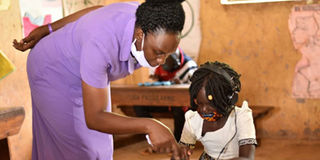Digital learning: Govt to buy tablets for UPE pupils

A teacher instructs a pupil on how to use a tablet at Nalongo Church of Uganda in Luweero District on Tuesday. PHOTO | DAMALIE MUKHAYE
What you need to know:
- Radio,TV dilemma. The plan to buy learners tablets comes at a time when the Education ministry has not yet delivered radio and TV sets to each household to facilitate virtual learning. In June, President Museveni promised to buy 10 million radios and TV sets to facilitate the continuity of learning. Mr Museveni said the radios would be distributed for free.
Government has announced plans to procure tablets for pupils in Universal Primary Schools (UPE) across the country. The move intends to facilitate digital learning as a way of improving literacy and numeracy during the Covid-19 pandemic.
Mr Alex Kakooza, the Permanent Secretary at the Ministry of Education, said they have partnered with the War Child Holland, a non-governmental organisation, to run a pilot study on digital learning.
He said the study started with 50 tablets that have been distributed to P3 pupils at Nalongo Primary School in Luweero District. He said if the outcome is positive, the exercise will be rolled out to other UPE schools.
“We are piloting it to see the learning outcome, especially on how learners improve and then scale it [up]. Scaling it does not mean its only government funding. We could still partner with other organisations,” Mr Kakooza said while launching the digital learning approach dubbed “We can’t wait” on Tuesday.
The country director of African regional representative of War Child Holland, Mr Jan Jaap Kleinrensink, said development partners are willing to support e-learning. He pledged donor support in the distribution of tablets.
Mr Kleinrensink said they have installed the curriculum from Primary One to Three on the tablets and learners will need guidance from either parents or teachers.
Dr Cleophus Mugenyi, the commissioner of basic education, said teachers will visit students at their respective homes to ensure learning takes place.
Survey on learning
A survey by the East African School of Library and Information Science (EASLIS) has revealed that more than 84 per cent of secondary school students in Uganda have difficulties in accessing study material for their learning proposed during the lockdown.
Titled ‘Information Seeking behaviour of Secondary School Students during the lockdown in Uganda,’ the survey was conducted in March from five districts in different regions of Uganda.
“The study established that 23.77 per cent were using print study material, 34.53 per cent used television, while 51.57 per cent used radio. However, 84.97 per cent indicated that the learning materials were not adequate,” the report stated in part.
It further added : “Thus, 90.4 per cent indicate that they need more information to supplement their study and learning during the lockdown.”
It was also revealed that reliance by students on school notes stood at 60.08 per cent, radio at 24 per cent and personal texts at 23 per cent while those on television were only 15.02 per cent.
Among the factors that constrained information access were limited access to public libraries, high data costs coupled with Over the top (OTT) charges and insufficient knowledge on how to use electronic resources.
While releasing the report at Makerere University yesterday, Ms Joyce Bukirwa, the principal researcher, said the report will help government and other stakeholders to formulate the right policies for e-learning.
She suggests that the government reduces cost of Internet access and OTT, establish community libraries, and allocate more time on radio and television lessons.
Mr Kakooza said they do not know when schools will reopen because they are still discussing Standard Operating Procedures with different stakeholders.




